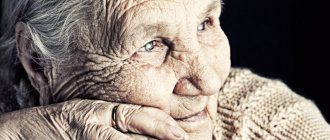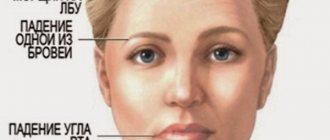What are hallucinations
Hallucinations are a pathological perception of reality in which a person does not see the difference between fictitious, non-existent images and objective reality.
The disorder can be visual, auditory, olfactory, tactile, or vestibular in nature. As a rule, the appearance of delusions and hallucinations in older people is associated with the development of various mental illnesses, dysfunction of the nervous system and brain function.
Characteristics of dementia
So, what kind of disease is dementia? This is a mental disorder (code in the ICD-10 classification – F00–F03) associated with pathological processes in the brain (BM). It is most often caused by degenerative and vascular disorders. The most common degenerative disease of the brain is Alzheimer's disease. It occurs due to the deposition of abnormal insoluble proteins (beta-amyloid) in the cerebral tissues between nerve cells and a decrease in the amount of another protein (tau protein) inside the brain cells. Both factors lead to the loss of synapses between neurons and their death, with subsequent impairment of the human psyche.
Other relatively common degenerative brain diseases that result in dementia are frontotemporal degenerations, Lewy's disease, Parkinson's disease, and Huntington's disease. About 2/3 of all dementias occur with Alzheimer's disease. Severe cerebrovascular disease (stroke) is usually not a cause of dementia, but very often occurs in a person simultaneously with a degenerative disease, worsening its course. It is believed that about 2/3 of all patients with Alzheimer's disease have significant vascular damage to the brain.
In neurology, a number of other, fortunately rare, brain diseases that cause dementia are also known. The most famous of them are prion diseases. In humans, Creutzfeldt-Jakob disease, which develops rapidly, most often begins after 50 years of age. In our country, there is about 1 case per 1 million inhabitants per year.
A number of neurological and internal diseases (endocrine diseases, vitamin deficiencies, encephalopathy, including alcoholic encephalopathy, untreated diabetes, etc.) may also be involved in the etiology of dementia. Some types of these dementias respond well to treatment.
Currently, there are two types of perception disorders:
- True hallucinations. They are highly realistic. It seems to a person that the perception of images and sensations occurs through the senses. These can be either only auditory or only visual hallucinations, or combined (for example, the patient will think that he is stroking a fluffy meowing cat).
- Pseudohallucinations. They do not have the characteristics of real physical objects. The patient may have the impression that the information received seems to immediately enter the brain, supposedly bypassing the senses. Typically, in old age, such hallucinations are auditory or tactile in nature (voices in the head, painful sensations, etc.).
It is important to understand that delusions and hallucinations in older people always signal the development of serious illnesses . To avoid irreversible consequences and restore the patient’s normal condition, it is necessary to consult with specialists as early as possible. Auditory and visual hallucinations of older people are especially dangerous, which often lead to life-threatening situations for the patient (for example, a person may fall from a height).
What is dementia and what is it confused with?
The word “dementia” is of Latin origin: de means “from” and mens means “mind.”
Thus, dementia is a state of being separated from one's own mind or disconnected from one's former life. Dementia itself, in all its various manifestations (decreased cognitive abilities, behavioral characteristics, mood, psychological state, impaired muscle memory, etc.) is a symptom, just like a cough or fever is a symptom of the flu.
Dementia is often confused with Alzheimer's disease. But the latter is a disease, a cause, while the various manifestations of dementia are only symptoms, consequences caused either by Alzheimer's disease, the most common cause of dementia, or by some other disease or disorder, for example, intoxication. If, after an examination, the doctor tells you the frightening news: “You have dementia,” your next question should be: “What caused it?”
In addition, it is necessary to distinguish dementia from delirium. Although they have similar symptoms, their causes are different.
Dementia is usually characterized as an irreversible decline in cognitive function with loss of short-term memory caused by organic brain damage, most often due to Alzheimer's disease or multiple foci of ischemic stroke.
Delirium is a condition characterized by impaired cognitive functions, clouding of consciousness and disorientation, which are reversible when the causes are eliminated. Symptoms of delirium develop quickly, rather than over a long period of time, as with dementia. I often recommend that caregivers conduct a thorough medical evaluation of their caregiver to rule out the possibility of delirium or other conditions that cause dementia-like symptoms.
A person with dementia may have the following symptoms, among others:
- confusion;
- disorientation;
- motor iterations (multiple repeated movements);
- impaired concentration and absorption of information;
- disturbance of orientation in space (for example, narrowing of the field of vision);
- anxiety;
- fear;
- paranoia.
Almost every patient with dementia experiences progressive loss of short-term memory. Also characterized by a shuffling gait, loss of balance, and impaired visuospatial functions.
Often, dementia negatively affects the ability to exercise sound judgment and self-control, causing the patient to engage in strange and uncharacteristic behavior. Difficulties may also arise with decision-making. Self-discipline and the ability to perform multiple tasks at the same time often suffer; Many people with dementia give up their usual activities if there are many distracting external stimuli.
Causes of hallucinations in old age
Delusions and hallucinations in older people are observed in various pathological conditions. Clinical manifestations and severity of the disorder depend on the severity of the concomitant disease. Common causes of hallucinations include:
- Parkinson's disease, Alzheimer's disease, dementia (senile dementia);
- Vascular lesions of the brain
- Brain tumors;
- Infectious diseases;
- Mental disorders – delirium (often accompanied by visual hallucinations), epilepsy, schizophrenia;
- Somatic diseases, neurodegenerative processes;
- Chronic intoxication (including alcoholism, drug addiction);
- Taking a number of medications (tranquilizers, psychostimulants, anticonvulsants, etc.);
- Sleep disturbances;
- Social isolation.
Note! Self-treatment of auditory, visual or other hallucinations in older people can lead to progression of the disorder and deterioration of the general condition. Only a team of qualified specialists can determine the exact causes of violations.
Treatment of hallucinations in elderly people at the AlkoSpas clinic
Effective treatment of hallucinations in older people is possible only if the causes of the disorder are correctly identified and concomitant diseases are treated correctly.
Treatment of perception disorders at the AlkoSpas medical center includes several stages:
- A comprehensive examination of the patient, allowing for the most accurate diagnosis of the causes of hallucinations;
- Prescribing treatment for the underlying disease that caused the perception disorder.
- Relieving symptoms of hallucinogenic syndrome;
- Psychosocial therapy and cognitive behavioral psychotherapy.
Depending on the patient’s condition, treatment of auditory, visual and other hallucinations in older people can be carried out on an outpatient basis or in the hospital of our clinic.
Why should you contact AlcoSpas?
- Since hallucinations in old age can have various causes, a team of qualified doctors (neurologist, psychiatrist, oncologist, narcologist) works with the patient.
- Throughout the treatment, the patient is under strict medical supervision. If necessary, the course of therapy can be adjusted to obtain the most effective results.
- Our doctors use only certified medications.
- Treatment at the clinic is completely anonymous. The patient's personal data is not transferred to third parties.
Often, hallucinations in old age cause situations that are dangerous for a person and can lead to serious injuries and the patient leaving home. If you notice even minor perception disorders in an elderly relative, you should immediately consult a doctor. Don’t wait until the patient’s condition becomes critical – sign up for a consultation today!
Treatment of the disease
An elderly person experiencing hallucinations must be seen by a psychiatrist as soon as possible - the behavior of such a patient is difficult to predict, so he can pose a potential danger to himself, his loved ones and neighbors.
This condition can also occur before death.
If the patient does not distinguish his visions from reality, it is futile to try to convince him. If the patient begins to behave aggressively and attack others, do not panic and call an ambulance as soon as possible.
Important! Do not hesitate to visit a specialist: only after a thorough personal examination of the patient and examination for the presence of infections (for example, encephalitis or syphilis) or cancer, the doctor will be able to prescribe the treatment he needs.
To make a correct diagnosis, the doctor needs to know about all the diseases that the patient suffers from.
It would not be superfluous for the patient to undergo a medical examination:
- blood and urine tests,
- computed tomography and MRI of the brain.
How to get to the doctor
It's easy to say, see a doctor. You can't force someone to see a psychiatrist. How, say, can relatives convince Klavdia Feodorovna that she is sick? She is convinced that she is being bullied. I wrote more than one statement to the police, and was in the governor’s reception room. Moreover, the organs react as expected. The upstairs neighbor had several checks carried out. What if there really is a drug den there? In fact, there lives a good family there, a husband and wife and two children. And what does it feel like for them when the police periodically come to them?
Claudia Fedorovna's family - son, granddaughter and son-in-law - tried to solve the problem in their own way. They offered her to live with her granddaughter, they thought that this would leave her with an obsessive state. But it didn’t work out: the “drug-poisoner” continued to “pursue” her.
Genes don't solve everything. It is important to constantly train your body and brain
“This kind of disease cannot be cured by changing your place of residence,” notes Inna Yazykova, “you need a doctor.” Any coercion when visiting a doctor is, of course, excluded; you need to act only by methods of persuasion. And there is no need to hide from the patient that the meeting will be with a psychiatrist. To begin with, you can say that you suggest that he, for example, consult a doctor about sleep problems. A person in such a state is indeed, as a rule, emotionally exhausted, he sleeps poorly, is constantly in fear, and worries. The professional will then arrange a conversation with him in the future.











